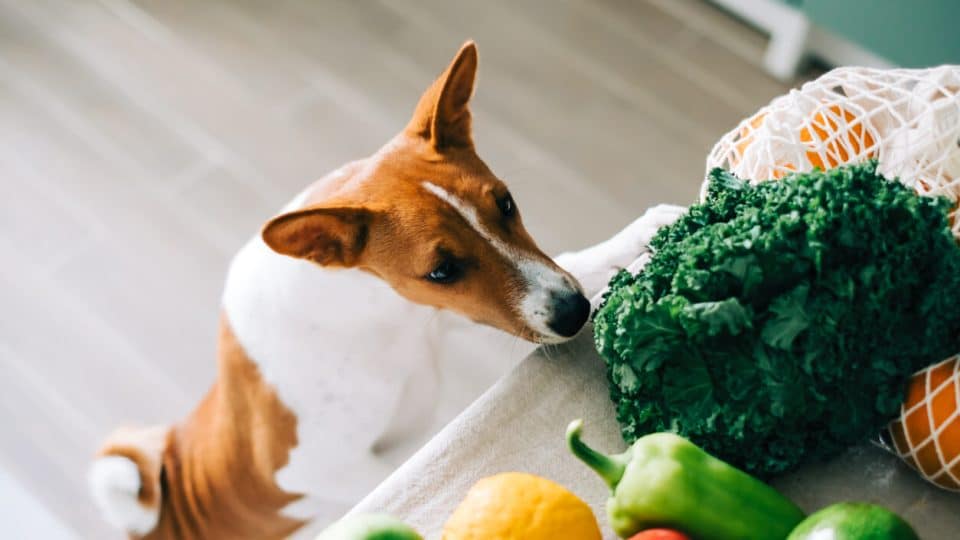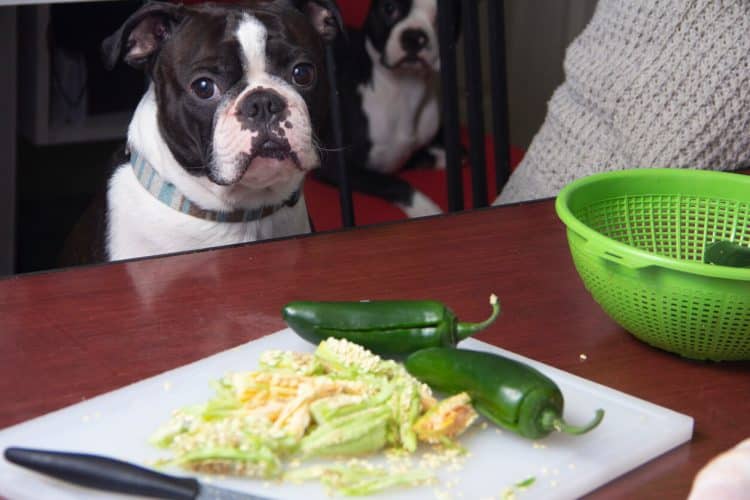- This post contains affiliate links. Read more here.
- Not a substitute for professional veterinary help.
Red, yellow, green, and orange bell peppers make a nutritious and low-calorie snack—for dogs and humans! Peppers are packed with beneficial vitamins like A and C, along with fiber and antioxidants. Dogs can eat peppers safely, and many pups enjoy their flavor and texture.
That said, a dog’s taste buds and digestive system may not tolerate spicy peppers as well. Our experts recommend you avoid feeding dogs hot chili peppers like jalapeno, serrano, and cayenne peppers.
Check out our guide below to learn more about the benefits of this crunchy summer vegetable for dogs, plus a few canine-friendly pepper recipes.
What Parts Of A Pepper Can Dogs Eat?
Dr. Renee Schmid, DVM, DABT, DABVT, a veterinary toxicologist at Pet Poison Helpline, says dogs can eat the entire pepper without toxic effects.
However, the stem is tough to digest, and most dogs don’t enjoy the taste or texture of pepper stems anyway, she says.
| Part of pepper | Safe for dogs? | Easily digestible? |
| Flesh | Yes | Yes |
| Placenta (the part the seeds are attached to) | Yes | No |
| Skin | Yes | Yes, but more digestible when cooked |
| Stem (peduncle) | Non-toxic but may cause gastrointestinal blockage | No |
| Glands (the white strips) | Yes | No |
| Seeds | Yes, but these contain the most capsaicin in spicy peppers | No |
Can dogs eat chili peppers?
Technically speaking, dogs can eat spicy peppers like jalapeno, cayenne, and serrano peppers. Yet while they aren’t technically toxic to dogs, they do contain capsaicin, which can irritate the mouth and digestive tract.
Dogs can taste spicy foods, so chili peppers will cause the same sensation of burning and heat that it does for you. This sensation can feel unpleasant and may frighten your pup.
Even a few pieces of any type of spicy pepper can also cause mild to severe digestive issues.
If your dog has eaten any spicy peppers, pay attention for these symptoms:
Has your dog accidentally gobbled up a spicy pepper? Dr. Schmid recommends offering them water, pet food, or treats. “This helps dilute the pepper in the stomach and minimizes the chance of irritation and vomiting,” she says.
Can dogs eat ground black pepper?
Black pepper comes from peppercorns, which come from an entirely different plant family. Even so, peppercorns aren’t toxic to dogs, either, Dr. Schmid says.
In short, a bite of black pepper won’t make your dog ill, but it may cause some sneezing and coughing.
How To Prepare Peppers For Your Dog
First, clean the pepper and remove the seeds and stems since dogs can’t digest these easily, says Dr. Kevin Puzycki, DVM and spokesperson for Solid Gold. Then, you can serve the peppers raw or cooked, chopped or whole, depending on your dog’s size and preferences.
“If your dog enjoys chewing on things, leaving the peppers uncut can provide an interactive and enjoyable chewing experience,” Dr. Puzycki says. “However, if your dog tends to swallow food without chewing, cut the peppers into smaller pieces.” Kibble-sized pieces are always a safe bet.
Keep in mind, too, that peppers should make up no more than 10% of your dog’s daily calorie needs—just like any other treat.
A few small pieces of pepper a day might be appropriate for a small dog, while larger dogs can generally eat half of a small to medium-sized pepper.
Tips for cooking peppers
Dogs can eat raw peppers, but they’ll generally have an easier time digesting cooked peppers.
Steaming is the safest option, but Dr. Schmid says it’s OK to use a small amount of vegetable or olive oil to sauté, roast, or air fry your dog’s peppers.
When preparing peppers for your dog, you’ll want to avoid:
- Using butter, grease, or other high-fat ingredients, since these can cause an upset stomach.
- Charring peppers, since this cooking method can also upset your dog’s stomach.
- Seasoning the peppers, especially with garlic and onion powder—these ingredients are toxic to dogs.
Do Peppers Have Benefits For Dogs?
Since dogs are omnivores, they can eat and benefit from a variety of fruits and vegetables. Puzycki says some of the benefits of peppers for dogs include:
| Nutrient | Benefit |
| Vitamin A | Vitamin A helps maintain good vision, supports growth and development, and promotes a healthy immune system. |
| Vitamin C | Vitamin C supports the immune system and your dog’s overall well-being. It also helps with collagen production, which is essential for healthy skin, joints, and connective tissues. |
| Fiber | Fiber aids digestion and helps regulate bowel movements. It’s especially beneficial for dogs with gastrointestinal issues and those who need support with digestive health. |
| Low calories | Peppers are good option for dogs on a weight management plan. They also make good alternatives to traditional treats since they provide a satisfying crunch and flavor without high fat or carbohydrates. |
| Antioxidants | Peppers contain various antioxidants, which may help lower the risk of certain diseases and support long-term health in dogs. |
| Moisture | Peppers have a high water content, so they can help dogs stay hydrated. |
When choosing between peppers, Puzycki suggests opting for red bell peppers, since they contain higher levels of essential vitamins A and C.
“Additionally, red bell peppers boast a greater number of antioxidants, such as beta-carotene and lycopene.”
Do Peppers Have Any Risks For Dogs?
Peppers can be a nutritious snack for dogs, but only in moderation. They don’t replace a complete and balanced meal, Dr. Schmid emphasizes.
What’s more, eating too many peppers may cause stomach issues, like vomiting or diarrhea.
To reduce the chances of stomach distress, you can:
- Remove the seeds and stems
- Start with a small amount
- Serve peppers only occasionally and in moderation
- Monitor your dog’s reaction
If your dog has never tried peppers before, start by giving them a small amount and watch for any adverse reactions, such as vomiting or loose stool. And of course, if you have any concerns about feeding peppers to your dog, it’s never a bad idea to check with your veterinarian first.
Dog-Friendly Pepper Recipes
Searching for a summer dog treat to use up those fresh bell peppers? We’ve got you covered.
Nutritious pepper pup-sicles
Puzycki says his pups go wild for frozen bell pepper cubes.
Directions:
- Cut raw or steamed peppers into bite-sized pieces.
- Add water.
- Freeze mixture in an ice cube or popsicle mold.
- Swap out the water for homemade bone broth or a store-bought version for an extra boost of flavor and nutrients.
“They love to bite and play with the frozen cubes,” Puzycki says. “As they chew or the ice melts, they are pleasantly surprised with another treat!”
Dehydrated veggie chews
Our Rover chef came up with healthy veggie chews for dogs using an at-home dehydrator.
Directions:
- Prepare a few cups of bell peppers by removing the stems, seeds, and pith.
- Slice peppers into 1/4″ strips.
- Place bell peppers in boiling water to blanch for 1 minute.
- Prepare a large bowl of ice and cold water.
- Add blanched peppers to ice water and let cool.
- Place cooled peppers onto a dry towel, adding another towel on top. Pat or squeeze gently.
- Layer dried peppers onto dehydrator trays, taking care to make sure they don’t touch each other.
- Dehydrate between 110-140°F for at least 8 hours.
- When fully dehydrated, allow peppers to cool to room temperature, then pack loosely in an airtight container or bag.
Tip: If your dog doesn’t care for peppers, you can make this recipe with any dog-safe fruit or vegetable!







